Emmys Politics 101: Why HBO dominates, “Dragon” overpowers “Rings” and some actors make history
Industry politics loom large over every awards season, but the version hanging over the 75th Emmy Awards nominations announcement is singularly outsized. Along with the expected contenders, surprises and snubs, the nominees were revealed hours before the extended deadline for negotiations between SAG-AFTRA and the AMPTP is set to expire.
That means Hollywood is bracing for what is increasingly likely to be the first time SAG-AFTRA and the Writers Guild of America walk picket lines together since 1960, and the actors guild’s first film and TV walkout since 1980. (Salon’s unionized employees are represented by the WGA East.)
One might therefore consider the 27 nominations for the final season of “Succession,” the most ever for the show, to be thematically consistent with the times. “Succession” revolves around a ruthless media titan unwilling to cede an inch of his power, who cares nothing about the well-being of any of the working class “pygmies” he sucks dry for profit. To viewers, Brian Cox’s Logan Roy is a fascinating monster. To the creative workers walking the picket line, he represents the forces aligned against them.
Stepping away the labor part of the story, there’s a figurative example that illustrates the vanity side of awards campaign politics in the head-to-head match-up between Prime Video’s “The Lord of the Rings: The Rings of Power” and HBO’s “House of the Dragon.”
Experiencing total satisfaction in the awards game is next to impossible.
Both fantasy shows ran their first seasons simultaneously, inviting direct comparisons and analysis of which was better. “Rings of Power” was vastly more expensive and looked it. On Emmy nominations morning almost a year later, “House of the Dragon” secured a spot in the best drama category while “Rings of Power” was shut out of major categories. (Both netted below-the-line nominations in creative arts categories including but not limited to makeup, title design and costume.)
In the past fantasy fans might have grumbled about Television Academy voters’ aversion to genre content, but besides “Dragon” in the best drama race is the deserving Disney+ “Star Wars” drama “Andor,” part of an especially strong showing by the Disney empire overall. “Rings of Power” is the farthest thing from a “small” show by Peak TV standards, and in the same respect, Amazon isn’t by any stretch a scrappy upstart rebel entering the field. Its streaming service has scored its share of top Emmy wins over the past decade, a few courtesy of returning best comedy nominee “The Marvelous Mrs. Maisel” and its stars Rachel Brosnahan, Alex Borstein, repeat nominees for best comedy actress and supporting comedy actress respectively.
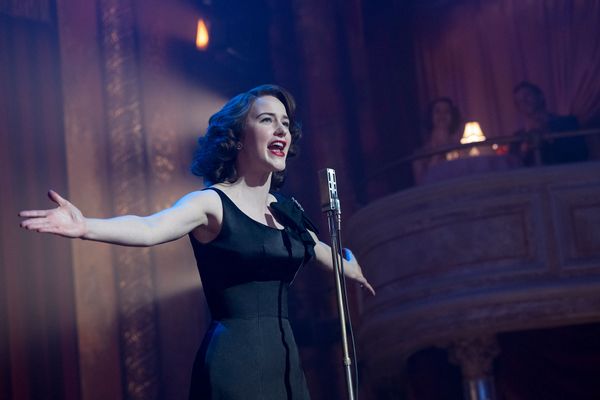 Rachel Brosnahan (Miriam ‘Midge’ Maisel) in “The Marvelous Mrs. Maisel” (Philippe Antonello/Prime Video)
Rachel Brosnahan (Miriam ‘Midge’ Maisel) in “The Marvelous Mrs. Maisel” (Philippe Antonello/Prime Video)
But Prime Video lacks the brand shimmer of HBO, which has a long-established prestige status and is part of a legacy media conglomerate, Warner Bros. Discovery. Hence HBO Max’s 127 total nominations, mainly spread between “Succession,” “The Last of Us” and “The White Lotus.” This is a fairly standard Emmy nominations spread for the premium network, along with Netflix’s second-place finish with 103 nominations overall. That’s politics for you, Hollywood style.
Sometimes TV’s version of the little guys win, as seen in the nominations for Freevee’s “Jury Duty” and James Marsden‘s supporting comedy actor nod, and Natasha Lyonne’s best comedy actress nomination for “Poker Face” on Peacock. (We should point out that Freevee is owned by Amazon, and Peacock is NBC Universal’s streaming service you’re probably still not watching.)
These were bursts of confetti in a mostly unsurprising nomination pool dominated by shows making their final run at Emmys glory, including “Barry” and returning victors “Succession,” “Ted Lasso” and “Maisel.”
“Succession” stars Jeremy Strong, Kieran Culkin – a first for him – and Cox, who only appeared in two full episodes and around 10 minutes of a third received lead actor nominations, joined Sarah Snook in the lead drama acting race. Theirs is part of an individual nomination spree that includes 14 of their co-stars, including J. Smith-Cameron and James Cromwell, but it also makes Emmy history, marking the first time three leads from the same show were nominated in the drama actor field.
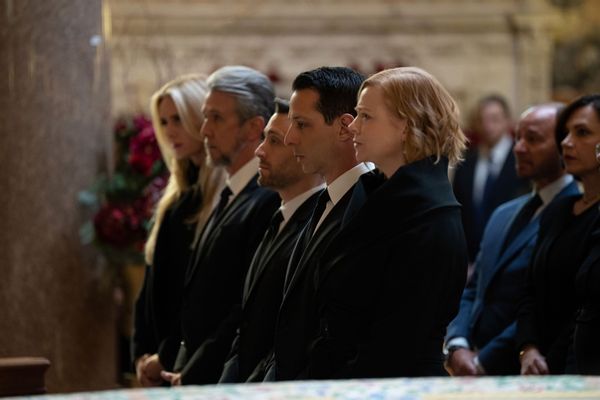 Justine Lupe, Alan Ruck, Kieran Culkin, Jeremy Strong and Sarah Snook in “Succession” (Macall Polay/HBO)
Justine Lupe, Alan Ruck, Kieran Culkin, Jeremy Strong and Sarah Snook in “Succession” (Macall Polay/HBO)
Of course, there’s a strong chance that a split vote in the actor race will rob all of the male Roys of their last shot at the big prize. Wouldn’t that be a very Roy-appropriate Emmys outcome?
What’s worrying about the 2023 nominations is that the voting tendencies mimic the direction that made the 2023 Oscars such a mixed emotional bag in several ways.
That’s politics for you, Hollywood style.
The first is a lack of creative diversity in the top-tier nominations. The drama best supporting actor and actress categories are almost entirely divided between “Succession” and “The White Lotus”; nominations for Elizabeth Debicki and Rhea Seehorn sneak “The Crown” and AMC’s “Better Call Saul” into the supporting actress race.
Another HBO series joins the “Succession” leads in the best drama actor race with Pedro Pascal’s nomination for “The Last of Us,” with Jeff Bridges (FX’s “The Old Man”) and Bob Odenkirk (“Better Call Saul”) rounding out the category.
“Ted Lasso” scored 14 major nominations including in best comedy, best actor for Jason Sudeikis, and supporting nods for Phil Dunster, Brett Goldstein, Juno Temple and Hannah Waddingham.
Only “Abbott Elementary” and “Barry” came close to its strong showing in the top races, with both joining “Ted Lasso” in the best comedy contest, Bill Hader taking on Sudeikis and Henry Winkler and Anthony Carrigan facing off on the supporting actor. Quinta Brunson’s ABC comedy earned her a lead actress nomination and her co-stars Tyler James Williams, Janelle James and Sheryl Lee Ralph slots in supporting categories.
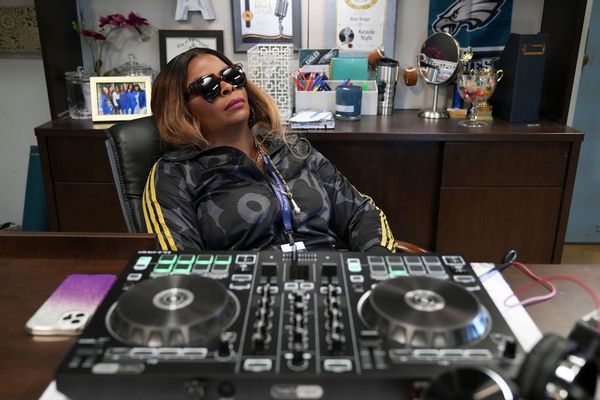 Abbott Elementary (ABC/Scott Everett White)
Abbott Elementary (ABC/Scott Everett White)
Segueing into the issue of inclusion, Emmys still has work to do. To some it may seem like there’s nothing Emmy can do to make some of us entirely happy on nominations day; my answer to that is that experiencing total satisfaction in the awards game is next to impossible.
There’s plenty worth celebrating in this batch, topmost among them being the nods for “Beef” and its stars Steven Yeun and Ali Wong and co-stars Joseph Lee and Young Mazino in their limited or anthology series races.
Between those acknowledgments and Dominique Fishback’s best actress nomination for her unsettling performance in the limited series “Swarm,” we have signs that Emmy voters are appreciating unconventional artistry. (And yet, no nods for Donald Glover’s other show “Atlanta” which, a few short years ago, earned voters the same praise.)
It’s also impossible to quibble with the supporting actress nomination for Niecy Nash-Betts for her work in the bewilderingly titled “Dahmer – Monster: The Jeffrey Dahmer Story.” She was the best thing about it.
The supporting actress comedy category is dominated by four Black performers: James, Ralph, Ayo Edebiri from “The Bear” and Jessica Williams from “Shrinking.” Non-white performers also had a strong showing in the guest actress in a comedy race where Brunson is nominated again for her “Saturday Night Live” hosting stint, along with Taraji P. Henson for her “Abbott” guest turn and Sarah Niles for “Ted Lasso.” Sam Richardson’s guest turn on the Apple TV+ hit earned him a guest actor comedy nomination as well.
And the 75th Emmy nominations made more history: Thanks to their individual acting nominations, “Wednesday” star Jenna Ortega and Pascal are the first Latino actors to be nominated in both lead acting categories in 15 years. “The Last of Us” guest star Keivonn Montreal Woodard is the youngest nominee in the drama guest actor category, where he’s joined by co-star Lamar Johnson (along with Murray Bartlett and the category favorite, Nick Offerman).
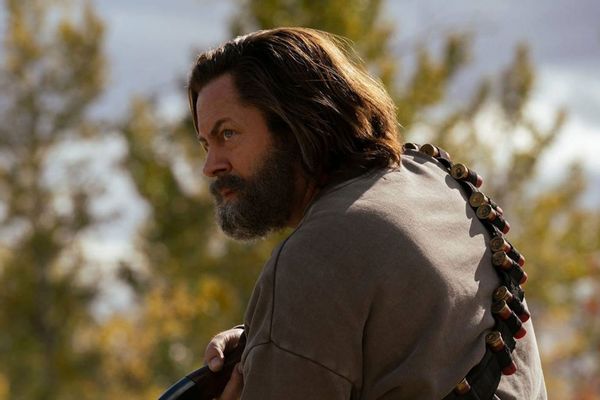 Nick Offerman in “The Last of Us” (Liane Hentscher/HBO)
Nick Offerman in “The Last of Us” (Liane Hentscher/HBO)
In the same category, Arian Moayed claims a place, making him one of a few Middle Eastern nominees along with his fellow “Succession” co-star and drama guest actress nominee Hiam Abbass, who is up against her former co-workers Cherry Jones and Harriet Walter, and Kumail Nanjiani, tapped for his “Welcome to Chippendales” performance.
But this circles back to that observation about the relative lack of diversity apparent in these selections. The Emmys might lead a person who doesn’t watch much TV might to believe that the majority of Black actors work for, like, four shows: “Abbott,” “The Bear,” “Ted Lasso” and “The Last of Us” – who along with the aforementioned actors also will see Storm Reid in the guest actress competition.
Want a daily wrap-up of all the news and commentary Salon has to offer? Subscribe to our morning newsletter, Crash Course.
Even with the high visibility for Latino performers in top categories, shows like Hulu’s “This Fool” and fellow Freevee comedy underdog “Primo” get a lot less gas than the titles in which Pascal appears or the IP parade float that is “Wednesday.”
They’re definitely not present on “The White Lotus” although, to that show’s credit, Will Sharpe and Aubrey Plaza are the only performers preventing the drama supporting actor categories from being entirely white. Neither the drama best actress nor the comedy best actor races include people of color.
And here’s the thing – these situations could have been avoided if voters had looked beyond the usual suspects. Mo Amer of Netflix’s “Mo” would have been a tremendous addition to the comedy actor race, along with D’Pharaoh Woon-A-Tai for “Reservation Dogs.” The absence of recognition for these actors, and Woon-A-Tai’s co-star Devery Jacobs, not to mention the lack of notice for “Reservation Dogs” or “Dark Winds” or Zahn McClarnon, is galling in a year of critically acclaimed Native storytelling.
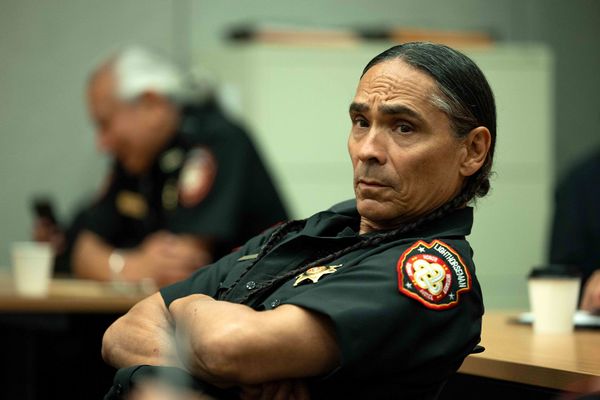 Zahn McClarnon as Big in “Reservation Dogs” (Shane Brown/FX)
Zahn McClarnon as Big in “Reservation Dogs” (Shane Brown/FX)
Then again, that places these snubs on actors and shows in fine company that includes Carol Burnett, passed over for her guest star appearance in “Better Call Saul”; and Harrison Ford, ignored for his work in both “Shrinking” and “1923,” where he co-starred with Helen Mirren, who also failed to score a nomination. “Only Murders in the Building” co-stars Steve Martin and Selena Gomez were both left out of the Emmys running, but Martin Short got a nice dip.
The nomination for “Obi-Wan Kenobi” could have gone to National Geographic’s miniseries “A Small Light,” but apparently voters prefer a Star War to a human story at the center of a real one.
Giancarlo Esposito was denied his flowers for his work on the final season of “Better Call Saul.” “Somebody Somewhere” is a star in our hearts, but Emmy didn’t extend it an invitation in this year’s nominations bonanza. Their work is stalwart, but their For Your Consideration marketing resources probably don’t come close to a “House of the Dragon” promotional hoard.
We may not find out who wins these races for some time. Although the 75th Emmy Awards are currently scheduled to air Monday, Sept. 18 on Fox, if the actors go on strike the ceremony could be pushed back as far as January 2024.
Read more
about this topic

